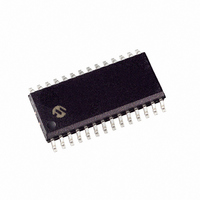DSPIC30F2010-30I/SO Microchip Technology, DSPIC30F2010-30I/SO Datasheet - Page 101

DSPIC30F2010-30I/SO
Manufacturer Part Number
DSPIC30F2010-30I/SO
Description
IC DSPIC MCU/DSP 12K 28SOIC
Manufacturer
Microchip Technology
Series
dsPIC™ 30Fr
Datasheets
1.DSPIC30F2011-20ISO.pdf
(66 pages)
2.DSPIC30F2010-20ISO.pdf
(202 pages)
3.DSPIC30F2010-20ISO.pdf
(18 pages)
4.DSPIC30F2010-20ISO.pdf
(6 pages)
5.DSPIC30F2010-20ISO.pdf
(26 pages)
6.DSPIC30F2010-20IMM.pdf
(204 pages)
Specifications of DSPIC30F2010-30I/SO
Core Processor
dsPIC
Core Size
16-Bit
Speed
30 MIPs
Connectivity
I²C, SPI, UART/USART
Peripherals
Brown-out Detect/Reset, Motor Control PWM, QEI, POR, PWM, WDT
Number Of I /o
20
Program Memory Size
12KB (4K x 24)
Program Memory Type
FLASH
Eeprom Size
1K x 8
Ram Size
512 x 8
Voltage - Supply (vcc/vdd)
2.5 V ~ 5.5 V
Data Converters
A/D 6x10b
Oscillator Type
Internal
Operating Temperature
-40°C ~ 85°C
Package / Case
28-SOIC (7.5mm Width)
Core Frequency
40MHz
Core Supply Voltage
5.5V
Embedded Interface Type
I2C, SPI, UART
No. Of I/o's
20
Flash Memory Size
12KB
Supply Voltage Range
2.5V To 5.5V
Package
28SOIC W
Device Core
dsPIC
Family Name
dsPIC30
Maximum Speed
30 MHz
Operating Supply Voltage
3.3|5 V
Data Bus Width
16 Bit
Number Of Programmable I/os
20
Interface Type
I2C/SPI/UART
On-chip Adc
6-chx10-bit
Number Of Timers
3
Lead Free Status / RoHS Status
Request inventory verification / Request inventory verification
Available stocks
Company
Part Number
Manufacturer
Quantity
Price
Part Number:
DSPIC30F2010-30I/SO
Manufacturer:
MICROCHIP/微芯
Quantity:
20 000
Company:
Part Number:
DSPIC30F2010-30I/SOG
Manufacturer:
TOS
Quantity:
453
16.6
When the STREN bit is ‘1’, the SCLREL bit may be
cleared by software to allow software to control the
clock stretching. The logic will synchronize writes to
the SCLREL bit with the SCL clock. Clearing the
SCLREL bit will not assert the SCL output until the
module detects a falling edge on the SCL output and
SCL is sampled low. If the SCLREL bit is cleared by
the user while the SCL line has been sampled low, the
SCL output will be asserted (held low). The SCL
output will remain low until the SCLREL bit is set, and
all other devices on the I
SCL. This ensures that a write to the SCLREL bit will
not violate the minimum high time requirement for
SCL.
If the STREN bit is ‘0’, a software write to the SCLREL
bit will be disregarded and have no effect on the
SCLREL bit.
16.7
The I
(I
Interrupt Flag). The MI2CIF interrupt flag is activated
on completion of a master message event. The SI2CIF
interrupt flag is activated on detection of a message
directed to the slave.
16.8
The I
and SCL signals for Fast Mode (400 kHz). The control
bit, DISSLW, enables the user to disable slew rate
control, if desired. It is necessary to disable the slew
rate control for 1 MHz mode.
16.9
The control bit IPMIEN enables the module to support
Intelligent Peripheral Management Interface (IPMI).
When this bit is set, the module accepts and acts upon
all addresses.
© 2008 Microchip Technology Inc.
2
C Master Interrupt Flag) and SI2CIF (I
2
2
C module generates two interrupt flags, MI2CIF
C standard requires slope control on the SDA
Software Controlled Clock
Stretching (STREN = 1)
Interrupts
Slope Control
IPMI Support
2
C bus have de-asserted
2
C Slave
16.10 General Call Address Support
The general call address can address all devices.
When this address is used, all devices should, in
theory, respond with an acknowledgement.
The general call address is one of eight addresses
reserved for specific purposes by the I
consists of all 0s with R_W = 0.
The general call address is recognized when the
General
(I2CCON<15> = 1). Following a Start bit detection, 8
bits are shifted into I2CRSR and the address is
compared with I2CADD, and is also compared with the
general call address which is fixed in hardware.
If a general call address match occurs, the I2CRSR is
transferred to the I2CRCV after the eighth clock, the
RBF flag is set, and on the falling edge of the ninth bit
(ACK bit), the master event interrupt flag (MI2CIF) is
set.
When the interrupt is serviced, the source for the
interrupt can be checked by reading the contents of the
I2CRCV to determine if the address was device
specific, or a general call address.
16.11 I
As a Master device, six operations are supported.
• Assert a Start condition on SDA and SCL.
• Assert a Restart condition on SDA and SCL.
• Write to the I2CTRN register initiating
• Generate a Stop condition on SDA and SCL.
• Configure the I
• Generate an ACK condition at the end of a
transmission of data/address.
received byte of data.
2
C Master Support
Call
dsPIC30F2010
2
C port to receive data.
Enable
(GCEN)
DS70118H-page 101
2
bit
C protocol. It
is
set























